Ramadan in the UAE: Traditions and Modern Life
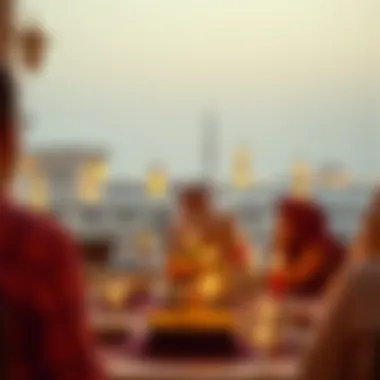
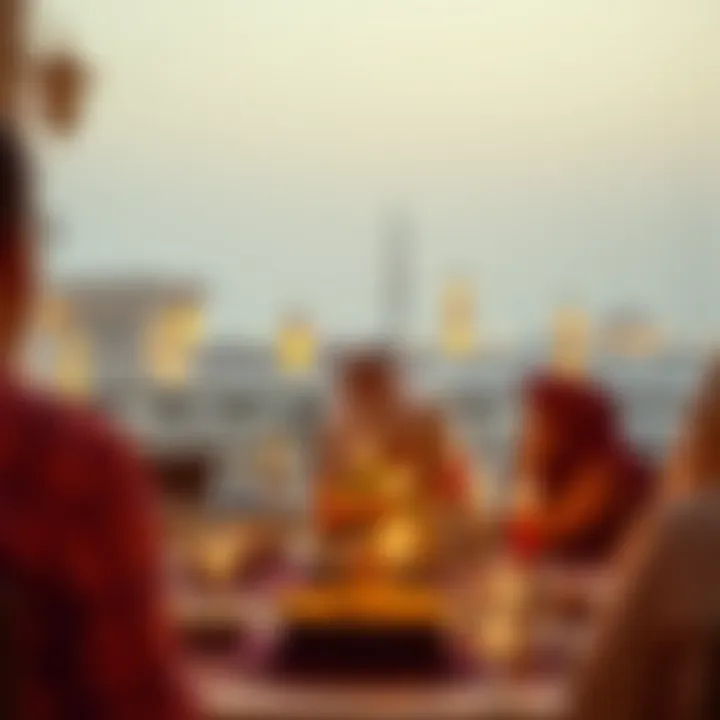
Intro
Ramadan in the United Arab Emirates is no mere observance of a month; it's a vibrant tapestry woven from cultural heritage and modern interpretations, embodying the spirit of unity among a diverse population. As the crescent moon marks the beginning of this holy month, which often falls in the sweltering heat of summer, communities come alive with rituals steeped in tradition and contemporary flair.
Throughout this article, we will journey through the multifaceted layers of Ramadan's influence in the UAE, where age-old practices seamlessly fit into the rhythm of modern life. From the communal iftar gatherings to the bustling markets and culinary delights that grace the tables at sunset, the UAE showcases a truly unique blend of old and new. This introductory segment sets the stage for a profound exploration of how traditions endure, evolve, and enrich the lives of those who call this land home. Look on as we unravel the rich social fabric woven together by shared experiences, economic exchanges, and hospitality that reflect both the heritage and aspirations of the UAE.
Market Analysis
Current Trends and Insights
As Ramadan unfolds each year, there's no doubt that its cultural impact resonates deeply within the UAE's economic landscape. Various businesses align their offerings with the season, creating special products tailored to this sacred month. From restaurants that whip up elaborate iftar menus featuring traditional dishes like harees and falafel, to hospitality sectors enhancing their services to cater to increased demand, Ramadan offers a snapshot of evolving consumer behavior.
The hospitality industry in particular sees heightened activity. Ramadan tents pop up across cities, providing spaces for people to gather and break their fast, while hotels offer themed stays and gourmet experiences. This aligns perfectly with the current trend of community bonding and experiential dining, marking a shift in how food and dining experiences are perceived.
"In the UAE, it’s more than about fasting; it’s about bringing people together and creating lasting memories during Ramadan."
Future Projections and Opportunities
Looking ahead, one can expect a rise in sustainable practices as communities and organizations increasingly focus on eco-friendly initiatives during Ramadan. This sustainable wave could range from reducing food wastage during iftar to promoting ethical sourcing of ingredients.
Digital transformation continues to shape how Ramadan is experienced, with the use of apps for seamless food delivery, virtual gatherings, and engaging online content. Brands that tap into these technological advancements will likely uncover new avenues for growth and deepen connections with their audience.
Lifestyle Considerations
Neighborhood Highlights
Different neighborhoods in the UAE exhibit unique flavors of how Ramadan is celebrated. Areas such as Deira give a nostalgic feel, where traditional souks bustle with energy during the month. You’ll find stalls offering dates and sweets, luring passersby with tempting aromas. Meanwhile, in more modern locales like Dubai Marina, the focus shifts toward innovative dining experiences, with rooftop iftars that offer breathtaking views.
Amenities and Services
As the sun dips below the horizon and residents head out for evening prayers, services ramp up to cater to the increased footfall. Grocery stores extend their hours, and supermarkets often stock up on seasonal items that reflect Ramadan's culinary delights.
Moreover, local mosques become focal points for community activities, hosting events ranging from Quran readings to charity drives. These initiatives underline the importance of giving back during this month, reinforcing the core values of compassion and solidarity that come with Ramadan.
In summary, Ramadan in the UAE is a celebration steeped in tradition while being dynamically intertwined with modern practices. It sets the stage for a unique blend of community, commerce, and spirituality, inviting all to partake in its rich narrative.
Prologue to Ramadan in the UAE
Ramadan holds a profound significance within the United Arab Emirates. This holy month is not merely a time for fasting; it is a period steeped in traditions that have evolved over centuries, embraced by a society rich in cultural diversity. Understanding Ramadan in the UAE provides a window into the blend of deep-rooted Islamic customs and modern observances that characterize this vibrant nation.
The importance of this topic cannot be overstated, as Ramadan serves as both a spiritual journey and a cultural phenomenon that permeates every aspect of life in the UAE. From bustling markets filled with special Ramadan products to the serene moments of Iftar shared among families and friends, the essence of the month is multifaceted. The UAE’s unique context, primarily as a melting pot of various cultures, adds layers to the observance of Ramadan, creating an atmosphere that is both traditional and contemporary.
Historical Context of Ramadan
To appreciate the current practices during Ramadan in the UAE, one must first delve into its historical background. This month is rooted in the Islamic calendar, observed during the ninth month, believed to be the time when the Quran was revealed to the Prophet Muhammad. The traditions surrounding Ramadan have been carried through generations, deeply influencing the way this holy month is celebrated today.
In the early days of Islam, fasting was a means of spiritual cleansing and self-discipline. Over time, this practice took on additional dimensions, with each country adapting customs that were reflective of local cultures. In the UAE, the Bedouin heritage plays a critical role, as customs like communal gatherings and hospitality during Ramadan can trace their origins back to ancient practices of sharing food and support within the community.
Today, the Ramadan experience in the UAE is characterized by a blend of these traditional elements and modern influences, showcasing how historical context can shape contemporary observance.
The Significance of Ramadan in Islam
Ramadan is often referred to as the month of mercy, forgiveness, and spiritual reflection. For Muslims, it is a time to foster a deeper relationship with Allah through prayer, recitation of the Quran, and charitable acts. Fasting from dawn until sunset is not just a physical acts of abstaining from food and drink but is integral to understanding empathy towards those less fortunate.
The significance of Ramadan is enshrined in the concept of Sawm, one of the Five Pillars of Islam. This emphasizes the importance placed on self-restraint and resilience. Fasting serves not just as a personal sacrifice, but also facilitates a collective spiritual cleansing. In the UAE, the significance of this month is amplified by community interactions and events designed to strengthen social ties.
Cultural Traditions During Ramadan
Ramadan brings with it an array of cherished cultural practices that resonate deeply within communities across the UAE. These traditions are a testament to the rich heritage of the region, weaving together the threads of faith, family, and hospitality. They play a vital role in fostering unity and understanding, making the observance of this holy month not just a personal journey, but a shared experience that transcends individual beliefs.
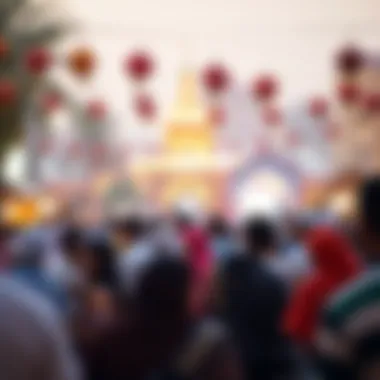
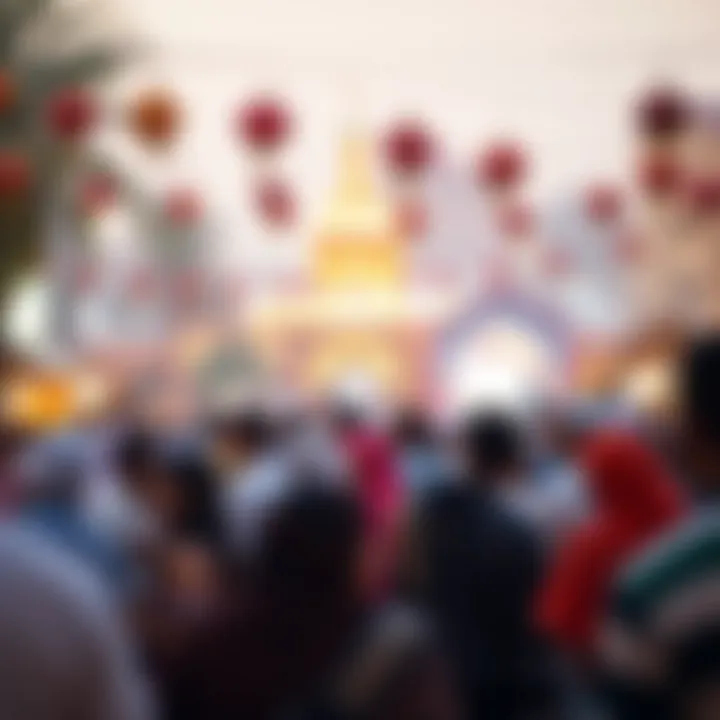
Iftar: The Breaking of Fast
Traditional Dishes
The moment of Iftar, when the fast is broken at sunset, is a significant highlight during Ramadan. Traditionally, dates and water kick off the meal, symbolizing a connection to the past and the customs of the Prophet Muhammad. They kickstart the metabolism after a long day of fasting, serving as both a nutritional choice and a cultural one. Popular dishes such as Harees, a mixture of wheat and meat, and delicious lentil soups showcase the culinary richness that accompanies this moment.
These traditional dishes are much more than food; they're a gathering point for families. The act of sharing meals strengthens bonds and creates a sense of belonging.
However, as families strive to balance health with indulgence, it can be a bit of a double-edged sword. While traditional dishes are wholesome, they tend to be heavy and often high in calories. It requires careful consideration to avoid feeling sluggish after iftar.
Modern Adaptations
In recent years, modern adaptations of Iftar have emerged, reflecting a blend of various culinary influences. Restaurants and home cooks alike experiment with international cuisines, incorporating flavors from Mediterranean, Asian, and Western kitchens. For instance, gourmet burgers, sushi platters, and vegan options have become more commonplace at Iftar tables.
These adaptations benefit the broader community experience, bridging cultural gaps and inviting everyone to partake in the feast. Such diversity is delightful and exciting; however, it can sometimes overshadow the more traditional elements, leading to a diluted experience of Ramadan's essence.
Suhoor: The Pre-Dawn Meal
Culinary Traditions
As crucial as Iftar, Suhoor is the pre-dawn meal that aids in sustaining energy throughout the fasting day. This meal typically includes hearty dishes like fava beans, bread, and yogurt. These culinary traditions are rooted in the belief that eating a nutritious and well-balanced meal can provide strength and endurance. The choice of foods often reflects the diverse culinary preferences within the UAE, creating a vibrant breakfast table that caters to different tastes.
Notably, Suhoor isn't just about sustenance; it plays a key role in community togetherness. Families often come together for this meal, reinforcing social bonds. On the downside, its early timing can lead people to skip this essential meal, potentially affecting their wellbeing throughout the day.
Health Considerations
When discussing health considerations, it’s vital to highlight how the pre-dawn meal affects fasting. Experts suggest incorporating slow-digesting foods rich in complex carbohydrates and proteins, such as oats and nuts, as these provide longer-lasting energy. Moreover, hydration is crucial; drinking plenty of water can ease the effects of long hours without food or drink.
Many people may not prioritize Suhoor, thinking they can 'wing it.' However, neglecting this meal can lead to fatigue, faintness, and headaches. It's particularly important, especially for those who engage in work or physical activities.
Ramadan in the UAE weaves together cultural traditions that serve to enrich not just the spirit but also the relationships among its people. From the breaking of fast with traditional foods to modern variations that pique curiosity, and from the sustenance of Suhoor to its significant health implications, each aspect underscores the communal and spiritual fabric of this month.
Community and Social Impact of Ramadan
The community and social impact of Ramadan in the UAE is profound, resonating through various aspects of life. This month is not just about fasting; it primarily fosters a sense of belonging and unity among diverse groups. Particularly in a melting pot like the UAE, the significance of Ramadan transcends cultural boundaries, encouraging charitable actions and strengthening social ties. The atmosphere during this period is infused with goodwill and a shared commitment to improving the lives of others, making it a focal point for community engagement.
Ramadan Initiatives and Charity
Fundraising Events
Fundraising events that pop up during Ramadan serve a crucial role in supporting various social causes. Organizations big and small orchestrate activities ranging from charity runs to lavish gala dinners, bringing people together for a common purpose. The key characteristic of these events is their ability to generate funds while simultaneously enhancing community spirit. For instance, events like the Ramadan Charity Run not only raise funds but also promote health and wellness as participants engage in physical activity during the month of fasting.
One appealing aspect of these fundraising events is the transparency with which they operate. Fundraisers often provide detailed reports on where contributions are directed, ensuring that donors see the tangible impact of their generosity. Alongside this, events also create a platform for local businesses to showcase their products and services, fostering a sense of collaboration within the community.
However, while many view these fundraising events positively, it’s important to stay mindful of the potential drawbacks. Organizing such events can sometimes lead to fatigue among participants who might feel overwhelmed by the numerous options available. Furthermore, striking a balance between festivity and purpose can be challenging.
Volunteerism in the Community
Volunteerism during Ramadan is another hallmark of community engagement, allowing individuals to contribute their time to support those in need. From food distribution drives to tutoring underprivileged children, volunteers embody the spirit of giving that defines this holy month. The key characteristic here is accessibility, as individuals of varied backgrounds invest their energy into acts of kindness, bridging gaps that might exist due to cultural differences.
Being a volunteering participant can be incredibly fulfilling. It carries the unique feature of learning, as many volunteers engage with various communities while gaining insights into their needs and perspectives. This not only benefits the recipients but enriches the volunteer’s understanding of the diverse fabric that makes up the UAE.
On the flip side, a downside to volunteerism can be its impact on the work-life balance for some. Those who overcommit may find themselves stretched too thin, leading to burnout. It’s essential for volunteers to strike a healthy balance here, ensuring they can contribute sustainably without neglecting personal wellbeing.
Cultural Exchange and Interfaith Relations
Encounters with Expat Communities
During Ramadan, encounters with expatriate communities highlight the rich tapestry of cultures coexisting in the UAE. The interactions that take place are pivotal, offering a glimpse into how traditions are shared and adapted. Such encounters cultivate a sense of inclusion that fosters mutual respect and understanding. The essence of this aspect lies in the blending of customs, where locals and expats participate in Iftar gatherings, sharing dishes and stories alike.
What's beneficial about these cross-cultural exchanges is the mutual learning that occurs. Locals often welcome expatriates in ways that underscore the values of hospitality found in Islam, while expatriates typically share their cultural backgrounds, creating a vibrant dialogue. Still, the challenge remains of ensuring that everyone feels represented and included, as dynamics can vary depending on individual experiences.
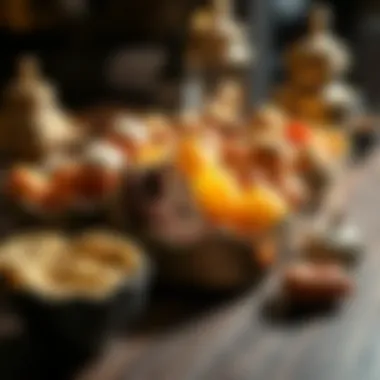
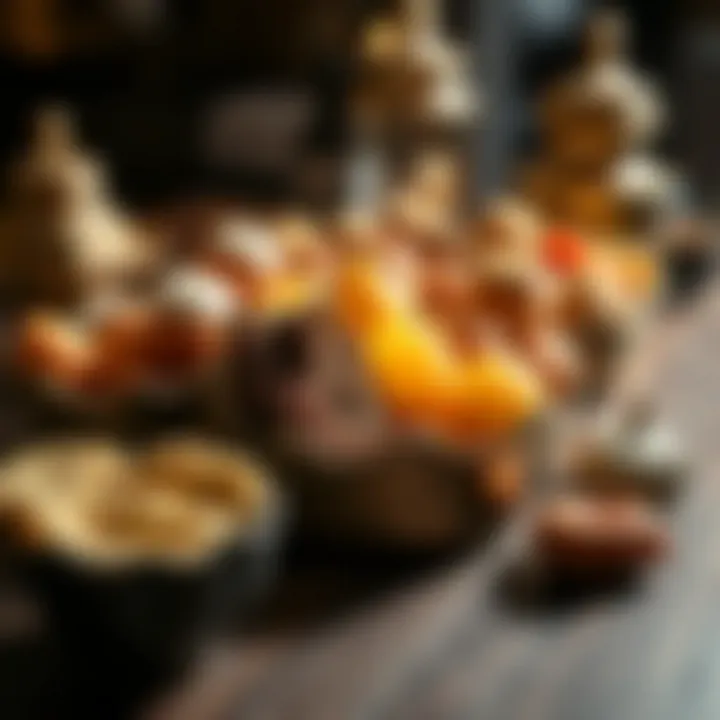
Promoting Understanding Across Cultures
The promotion of understanding across cultures during Ramadan is vital in a diverse society like the UAE. Initiatives that promote interfaith discourse encourage dialogue that transcends religious divides. Their key characteristic is the organization of forums and discussions that invite diverse groups to share their beliefs and practices, leading to greater mutual respect.
These initiatives are beneficial for fostering harmony in a multicultural environment. They facilitate connections through common human experiences—things like gratitude, compassion, and community service—reminding everyone involved of their shared values. Nonetheless, challenges do exist, as some individuals may approach these discussions with preconceived notions that need addressing to facilitate genuine dialogue.
The blend of community service, multicultural encounters, and charitable actions during Ramadan generates a powerful synergy that reinforces the social fabric of the UAE. By embracing both traditional values and modern practices, this month stands as an exemplar for how different cultures can coexist while contributing to a brighter, unified future.
Economic Dimensions of Ramadan in the UAE
Ramadan in the UAE is not only a time of spiritual reflection but also has profound economic implications that touch various sectors. The significance of this month resonates through its impact on consumer behavior, especially regarding spending patterns around Iftar and Sahoor. This section delves into how Ramadan facilitates a dynamic economic environment, shaping retail trends and transforming the hospitality sector. The unique blend of culture and commerce during this holy month provides both challenges and opportunities, reinforcing the UAE's position as a pivotal player in the regional economy.
Ramadan Sales and Promotions
Retail Trends
Retail trends during Ramadan showcase a distinct pattern in consumer purchasing. With the month often seen as a time for generosity and sharing, many retailers ramp up promotions, enticing shoppers to splurge on food items, gifts, and clothing. One notable feature is the rise of special Ramadan tents and pop-up shops that offer exclusive items, sustaining the spirit of giving.
Many brands embrace the notion of tailored deals and discounts. While this approach can boost sales, it's also a double-edged sword—if the promotions don’t resonate with the intended audience, retailers risk losing customers to competitors who understand their needs better. Additionally, limited-time offers create urgency among consumers, leading to a surge in foot traffic that can send sales soaring.
Hospitality Sector Dynamics
The hospitality industry flourishes during Ramadan as hotels and restaurants curate special menus and Iftar events that celebrate the essence of togetherness. This month sees a spike in demand for lavish buffets, thematic gatherings, and community-focused dining experiences. A standout feature in this sector is the emphasis on opulence and cultural authenticity:
- Many dining establishments offer traditional dishes
- Special culinary events designed to attract both locals and visitors
This surge presents financial opportunities for businesses, yet there are also notable challenges. The key is balancing quality with affordability as demand rises; failing to do so may lead to customer dissatisfaction. Additionally, the increased operational costs during Ramadan may pressure smaller establishments that lack the financial buffer.
Tourism During Ramadan
The unique flavor of Ramadan also draws tourists, who may seek to experience the cultural richness of this holy month. This influx fosters a vibrant atmosphere filled with events and activities that cater to different interests.
Attractions and Events
During Ramadan, various attractions shine brightly in the spotlight. Events such as night markets and cultural festivals are commonplace, offering everything from artisan goods to traditional performances. One of the appealing aspects of these events is the chance for visitors to engage with local customs in a lively environment:
- Community gatherings with activities promote cultural exchange
- Short film festivals illuminate local storytelling
These occasions are not only thrilling for tourists but also provide local businesses an opportunity to gain visibility and boost sales. The communal spirit of Ramadan resonates well, creating a buzz that draws both families and individuals looking for enriching experiences.
Challenges for Tourists
However, the experience of tourists during Ramadan is not without its setbacks. The altered operational hours for restaurants and shops can often lead to confusion. Many establishments close during daylight hours and open only in the evening for Iftar, which could limit options for visitors unaware of the customs.
Moreover, the cultural practices during Ramadan may require tourists to adjust their behavior in social settings, potentially leaving some feeling out of place if they are not fully informed. While the aim is to immerse themselves in the local culture, understanding these nuances can be challenging for outsiders.
"The vibrancy of Ramadan, with its blend of economic activity and cultural practices, transforms the UAE into a melting pot of experiences, yet it demands a certain adaptability from all participants."
Modern Practices in Ramadan Celebrations
In today’s fast-paced world, the holy month of Ramadan has become a canvas for a blend of traditional and modern expressions. As families gather for meals and prayers, new practices sprout up, reflective of the digital age we live in. This section delves into how modern elements, particularly social media and technology, have molded the observance of Ramadan, allowing for deeper connection and engagement.
Social Media and Ramadan
Influencer Engagements
In the age of social media, influencers have carved a niche by engaging with their followers during Ramadan. They often share insights about their personal experiences, culinary adventures, or charitable initiatives. The key characteristic of influencer engagements is their relatability. Many people find comfort in seeing everyday individuals, rather than polished celebrities, explain and celebrate the traditions of Ramadan.
For example, an influencer sharing their Suhoor meal prep or how they engage in community service brings authenticity to the conversation. This engagement is a beneficial choice for highlighting modern observances of Ramadan because it reaches a diverse audience, particularly younger generations. The unique feature of these posts is how they seamlessly combine personal stories with cultural significance, helping to promote understanding and awareness about the practices surrounding Ramadan.
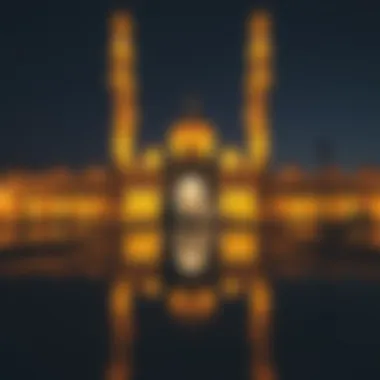
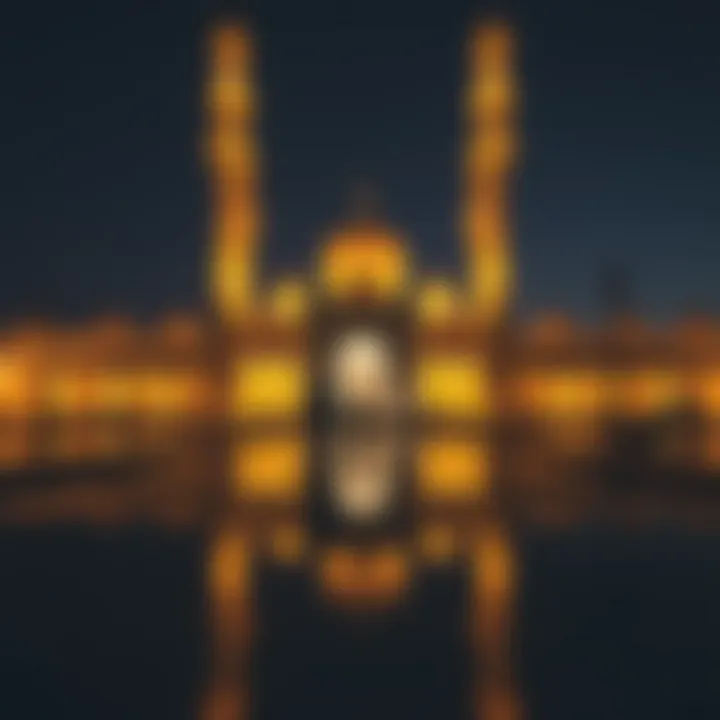
However, there are some disadvantages to consider. Sometimes, influencers may focus more on aesthetics or sponsored content, which can overshadow the spiritual aspects of the month. Thus, while influencer engagements have certainly enriched the Ramadan narrative, they also require a discerning eye from followers to appreciate the genuine spirit behind the celebrations.
Virtual Iftar Experiences
With the rise of technology, virtual Iftars have emerged as a creative way to connect people who are miles apart. Families and friends can gather online to share a meal, discuss their reflections on the day's fast, and support each other's spiritual journeys. The essence of virtual Iftar experiences is accessibility; anyone with an internet connection can partake, regardless of their geographical location.
This modern practice is beneficial since it fosters a sense of community during a time often marked by solitude for some. Unique to virtual Iftars is the possibility of including guest speakers, cultural presentations, or recitations that enrich the experience further. These virtual gatherings enhance camaraderie while maintaining the essence of connection.
Yet, such digital interactions do come with challenges. The lack of physical presence may lessen the experience for those who cherish the warmth and tradition of dining together. Moreover, technical glitches can dampen enthusiasm, especially if participants cannot connect or see each other. Despite these drawbacks, virtual Iftars stand as a testament to how technology can adapt and shape cultural practices in the modern age.
Technology's Role in Ramadan
Mobile Applications
Mobile applications have played a pivotal role in enhancing the observance of Ramadan. These apps offer features like prayer times, Quran recitations, and reminders to reflect on daily spiritual goals. Their primary characteristic is convenience, allowing users to access valuable resources at the touch of a button.
For instance, an app that tracks fasting hours or features guided meditations can make it easier for individuals to stay focused throughout the month. They are a popular choice for many looking to navigate the spiritual and practical aspects of Ramadan effortlessly. A unique feature of these applications is their integration with local community events, encouraging app users to participate in charitable efforts or volunteer opportunities.
Both advantages and disadvantages abound with these apps. While they provide a range of resources and support, the risk lies in over-reliance on technology, which can detract from genuine personal reflection or awareness. Balancing technology with traditional practices is essential to maintain the spirit of Ramadan.
Online Community Forums
Online community forums also serve as a place for discussions and support during Ramadan. Many expatriates or those who are new to the UAE find solace in these platforms as they share experiences or seek advice. The key characteristic of these forums is inclusivity, allowing various voices to be heard and respected.
Such forums are beneficial for fostering understanding among diverse groups and can provide practical tips, like where to find the best Iftar spots or the most meaningful volunteer opportunities. A unique attribute is their real-time interaction, where community members can respond instantly to queries and offer support.
Yet, some challenges do emerge. Not all information shared may be accurate, leading to potential misunderstandings. Furthermore, moderators are often needed to guide conversations and prevent conflicts, which sometimes can deter participation. However, the value these forums hold for building community and understanding cannot be understated, especially in a culturally rich environment like the UAE.
Observing Ramadan in Diverse Environments
Ramadan, an essential period in the Islamic calendar, holds distinct meanings across varying settings, particularly in the UAE's urban and rural communities. The observance of Ramadan in these environments illustrates both continuity and change, highlighting how cultural traditions adapt to the backdrop of modern life. This section dives into how such differences shape the experiences of communities and individuals during this holy month.
Ramadan in Urban vs. Rural Areas
In urban areas of the UAE, such as Dubai and Abu Dhabi, the atmosphere during Ramadan is electrifying. Streets are adorned with decorative lights, and grand mosque gatherings draw thousands of people. The convenience of modern amenities plays a critical role here. Iftar tents pop up, ready to serve various culinary delights from across the globe. With the cities bustling, businesses tailor their hours and menus to cater to the fasting populace. Moreover, social gatherings often take place in lavish restaurants that offer special iftar buffets, blending tradition with contemporary luxury.
Conversely, in rural parts, like Al Ain or smaller towns, Ramadan is celebrated with a more communal spirit. Here, you'll find family gatherings where meals are made with love and care, often centered around traditional recipes that have been passed down generations. The emphasis is less on extravagance and more on community. Rural families might host simple iftars, drawing neighbors and friends together to share not just in food but in stories and laughter, nurturing bonds that run deep.
This contrast offers valuable insight: while urban Ramadan may embrace a fast-paced, high-energy atmosphere, the rural counterpart celebrates a slower, more intimate connection. Each setting has distinct challenges—rural areas might contend with a lack of facilities while urban populations face the hurdle of shorter communal connections. These differences shape the essence of the holy month, emphasizing the diverse tapestry of lifestyles in the UAE.
The Role of Expatriates in Ramadan Celebrations
Expatriates form a significant part of the UAE's fabric, contributing to the rich diversity that defines the country. During Ramadan, their role becomes particularly compelling. Many expatriates seize the opportunity to learn about Islamic traditions, stepping out of their comfort zones to engage with local customs. This includes participating in iftar meals, where they can experience the breaking of the fast alongside Emirati friends and neighbors. The warmth of hospitality in the UAE is palpable, as invitations to share meals and stories serve as bridges connecting cultures.
Some expats even take part in local charity events, further immersing themselves in community activities. Whether it be through volunteering to serve food at community kitchens or donating to local charities, their involvement helps foster a spirit of unity and understanding.
Reflecting on these experiences, it's noteworthy how cultural exchange unfolds during Ramadan. Such interactions enrich the understanding of Islamic practices and promote tolerance, contributing to a society that is as multifaceted as it is cohesive. Expatriates, who might initially feel like outsiders, often find inclusion and a sense of belonging, which embodies the essence of Ramadan—a time for reflection, community, and connection.
"It’s the little things that count. When we share food and stories during Ramadan, it’s not just an act of breaking fast; it’s a sharing of life itself."
In summary, observing Ramadan across different environments in the UAE presents a rich tapestry of experiences. The contrasts between urban and rural celebrations, alongside the active involvement of expatriates, underline a communal and inclusive spirit that resonates throughout this holy month. Together, these elements create an atmosphere of understanding and engagement that transcends cultural barriers.
End
Reflecting on Ramadan's significance today offers a window into the heart of modern-day cultural identity in the UAE. As the country evolves, so too does the understanding and celebration of this holy month. Ramadan is not merely a time for fasting; it is an opportunity for reflection, connection, and community building. For expatriates and locals alike, embracing the spirit of generosity and hospitality during this time fosters unity and shared experience.
Reflecting on Ramadan's Relevance Today
The relevance of Ramadan today stretches beyond religious observance; it is intertwined with social dynamics and economic activities that resonate throughout the UAE. Many view Ramadan as a reminder of the values of compassion, charity, and togetherness. As the month unfolds, it showcases an intricate tapestry of cultural expressions ranging from traditional storytelling gatherings to contemporary virtual meetups.
Key Aspects to Consider:
- Cultural Cohesion: Ramadan serves as a bonding experience, drawing communities together, shedding light on shared values across different cultures.
- Economic Contributions: The economic activities during this period—ranging from increased sales in dining and retail sectors to the tourism boom—highlight how Ramadan enriches the local economy.
- Digital Engagement: With technology becoming more integrated, online discussions and social media engagements have diversified how people connect and share their experiences, making the observance more accessible.
"Ramadan reminds us that no matter where we are from, we can find common ground in empathy and understanding."
Overall, Ramadan in the UAE stands as a prime example of how traditions can remain relevant in a fast-paced modern world. Whether it be through community initiatives or enhanced social connections, the essence of this holy month continues to resonate deeply within the diverse fabric of Emirati life. The ways in which these practices have adapted and endured are not just reflections of faith; they are snapshots of an evolving cultural narrative. Institutions and individuals alike strive to hold onto the values that Ramadan embodies, ensuring that, even amid progress and change, the spirit of this sacred month remains as strong as ever.











